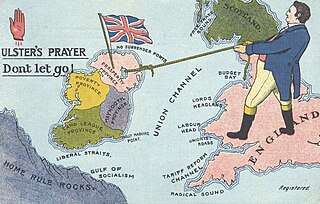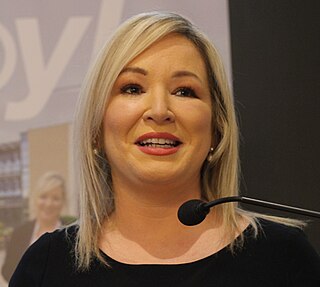
Northern Ireland is one of the four countries of the United Kingdom, situated in the north-east of the island of Ireland. It was created as a separate legal entity on 3 May 1921, under the Government of Ireland Act 1920. The new autonomous Northern Ireland was formed from six of the nine counties of Ulster: four counties with unionist majorities – Antrim, Armagh, Down, and Derry/Londonderry – and two counties with slight Irish nationalist majorities – Fermanagh and Tyrone – in the 1918 General Election. The remaining three Ulster counties with larger nationalist majorities were not included. In large part unionists, at least in the north-east, supported its creation while nationalists were opposed.

The Democratic Unionist Party (DUP) is a unionist, loyalist, British nationalist and national conservative political party in Northern Ireland. It was founded in 1971 during the Troubles by Ian Paisley, who led the party for the next 37 years. Currently led by Jeffrey Donaldson, it is the second largest party in the Northern Ireland Assembly, and is the fifth-largest party in the House of Commons of the United Kingdom. The party has been described as centre-right to right-wing and socially conservative, being anti-abortion and opposing same-sex marriage. The DUP sees itself as defending Britishness and Ulster Protestant culture against Irish nationalism and republicanism. It is also Eurosceptic and supported Brexit.

Unionism in Ireland is a political tradition that professes loyalty to the crown of the United Kingdom and to the union it represents with Great Britain. The overwhelming sentiment of Ireland's Protestant minority, unionism mobilised in the decades following Catholic Emancipation in 1829 to oppose restoration of a separate Irish parliament. Since Partition in 1921, as Ulster unionism its goal has been to retain Northern Ireland as a devolved region within the United Kingdom and to resist the prospect of an all-Ireland republic. Within the framework of the 1998 Belfast Agreement, which concluded three decades of political violence, unionists have shared office with Irish nationalists in a reformed Northern Ireland legislature and executive. Currently, they are refusing cooperation in this consociational arrangement to protest what they see as an attempt, post-Brexit, to distance Northern Ireland from Great Britain through European Union compliant trade rules.

The Northern Ireland Assembly, often referred to by the metonym Stormont, is the devolved legislature of Northern Ireland. It has power to legislate in a wide range of areas that are not explicitly reserved to the Parliament of the United Kingdom, and to appoint the Northern Ireland Executive. It sits at Parliament Buildings at Stormont in Belfast.
The Northern Ireland Executive is the devolved government of Northern Ireland, an administrative branch of the legislature – the Northern Ireland Assembly. It is answerable to the assembly and was initially established according to the terms of the Northern Ireland Act 1998, which followed the Good Friday Agreement. The executive is referred to in the legislation as the Executive Committee of the assembly and is an example of consociationalist ("power-sharing") government.

United Ireland, also referred to as Irish reunification, or a New Ireland, is the proposition that all of Ireland should be a single sovereign state. At present, the island is divided politically; the sovereign Republic of Ireland has jurisdiction over the majority of Ireland, while Northern Ireland, which lies entirely within the Irish province of Ulster, is part of the United Kingdom. Achieving a united Ireland is a central tenet of Irish nationalism and Republicanism, particularly of both mainstream and dissident republican political and paramilitary organisations. Unionists support Northern Ireland remaining part of the United Kingdom and oppose Irish unification.

Naomi Rachel Long MLA is a Northern Irish politician who served as Minister of Justice in the Northern Ireland Executive from January 2020 to October 2022. She has served as leader of the Alliance Party since 2016 and a Member of the Legislative Assembly (MLA) for Belfast East since 2020.

Arlene Isobel Foster, Baroness Foster of Aghadrumsee,, is a British broadcaster and former politician from Northern Ireland who served as First Minister of Northern Ireland from 2016 to 2017 and from 2020 to 2021. She was also leader of the Democratic Unionist Party (DUP) from 2015 to 2021. Foster was the first woman to hold either position. She is a Member of the House of Lords, having previously been a Member of the Legislative Assembly (MLA) for Fermanagh and South Tyrone from 2003 to 2021.
The St Andrews Agreement is an agreement between the British and Irish governments and Northern Ireland's political parties in relation to the devolution of power in the region. The agreement resulted from multi-party talks held in St Andrews in Fife, Scotland, from 11 to 13 October 2006, between the two governments and all the major parties in Northern Ireland, including the two largest, the Democratic Unionist Party (DUP) and Sinn Féin. It resulted in the restoration of the Northern Ireland Assembly, the formation of a new Northern Ireland Executive and a decision by Sinn Féin to support the Police Service of Northern Ireland, courts and rule of law.

The 2007 Northern Ireland Assembly election was held on Wednesday, 7 March 2007. It was the third election to take place since the devolved assembly was established in 1998. The election saw endorsement of the St Andrews Agreement and the two largest parties, the Democratic Unionist Party (DUP) and Sinn Féin, along with the Alliance Party, increase their support, with falls in support for the Ulster Unionist Party (UUP) and the Social Democratic and Labour Party (SDLP).

Michelle O'Neill is an Irish politician who served as deputy First Minister of Northern Ireland between 2020 and 2022. She has been serving as Vice President of Sinn Féin since 2018 and is the Member of the Legislative Assembly (MLA) for Mid Ulster since 2007.
The First Minister and deputy First Minister of Northern Ireland are the joint heads of government of Northern Ireland, leading the Northern Ireland Executive and with overall responsibility for the running of the Executive Office. Despite the titles of the two offices, the two positions have the same governmental power, resulting in a duumvirate; the deputy First Minister, customarily spelled with a lowercase d, is not subordinate to the First Minister. Created under the terms of the 1998 Good Friday Agreement, both were initially nominated and appointed by members of the Northern Ireland Assembly on a joint ticket by a cross-community vote, under consociational principles. That process was changed following the 2006 St Andrews Agreement, such that the First Minister now is nominated by the largest party overall, and the deputy First Minister is nominated by the largest party from the next largest community block.

The 2017 Northern Ireland Assembly election was held on Thursday, 2 March 2017. The election was held to elect members (MLAs) following the resignation of deputy First Minister Martin McGuinness in protest over the Renewable Heat Incentive scandal. McGuinness' position was not filled, and thus by law his resignation triggered an election.
This is a list of the members of the fifth Northern Ireland Assembly, the unicameral devolved legislature of Northern Ireland. Members of the Legislative Assembly (MLAs) elected on 5 May 2016 or subsequently co-opted are listed by party and by constituency.

The Renewable Heat Incentive scandal, also referred to as RHIgate and the Cash for Ash scandal, is a political scandal in Northern Ireland that centres on a failed renewable energy incentive scheme that has been reported to potentially cost the public purse almost £500 million. The plan, initiated in 2012, was overseen by Arlene Foster of the Democratic Unionist Party (DUP), the then-Minister for Enterprise, Trade and Investment. Foster failed to introduce proper cost controls, allowing the plan to spiral out of control. The scheme worked by paying applicants to use renewable energy. However, the rate paid was more than the cost of the fuel, and thus many applicants were making profits simply by heating their properties.

The 2022 Northern Ireland Assembly election was held on 5 May 2022. It elected 90 members to the Northern Ireland Assembly. It was the seventh assembly election since the establishment of the assembly in 1998. The election was held three months after the Northern Ireland Executive collapsed due to the resignation of the First Minister, Paul Givan (DUP), in protest against the Northern Ireland Protocol.
This is a list of the 90 members of the sixth Northern Ireland Assembly, the unicameral devolved legislature of Northern Ireland. The election took place on 2 March 2017, with counting finishing the following day; voter turnout was estimated at 64.8%.

New Decade, New Approach (NDNA) is a 9 January 2020 agreement which restored the government of the Northern Ireland Executive after a three-year hiatus triggered by the Renewable Heat Incentive scandal. It was negotiated by Secretary of State for Northern Ireland Julian Smith and Irish Tánaiste Simon Coveney.

A Northern Ireland Assembly election has to be held to elect 90 members to the Northern Ireland Assembly if the parties fail to form an Executive, which they have yet to do. After the Northern Ireland Assembly election on 5 May 2022, the DUP declined to agree on the appointment of Speaker to the Assembly, preventing the formation of an Executive. Chris Heaton-Harris, the Secretary of State for Northern Ireland, confirmed a legal obligation to call an election if no Executive was formed by a 27 October 2022 deadline. No Executive was formed by this deadline, but the deadline was extended by legislation in the Westminster Parliament. A deadline of 18 January 2024 was then proposed, but an executive still has not formed as of January 2024.

Local elections were held in Northern Ireland on 18 May 2023. The elections were delayed by two weeks to avoid overlapping with the coronation of King Charles III. Following the elections, Sinn Féin became the largest party in local government for the first time. It also marked the first time that nationalist parties had garnered a greater share of the vote than unionist parties.













